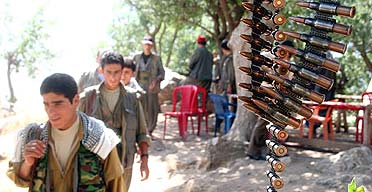
Monday July 30, 2007 | Ewen MacAskill in Washington

But it refused to comment on a report that the US is planning a covert operation to send special forces into action to try to neutralise the leadership of the Kurdistan Workers party (PKK), which has been mounting attacks inside Turkey.
The US is trying to persuade the Turkish army against taking matters into its own hands by invading northern Iraq, where the Kurds have established an autonomous region.
Washington, faced with a myriad of problems in Iraq, does not need a new front opening up in the country.
Bryan Whitman, a Pentagon spokesman, today would neither confirm nor deny that a covert operation is being planned. But he said: "We recognise that the PKK is a serious problem and we're working closely with both the government of Iraq and the government of Turkey to resolve this."
The veteran American columnist, Robert Novak, in the Washington Post, disclosed that Eric Edelman, an undersecretary of defence and former ambassador to Turkey, told selected Congressmen in private last week about the planned covert operation. The administration is required by law to inform Congress of any such operations.
Mr Novak wrote that the US forces would "behead the guerrilla organisation by helping Turkey get rid of PKK leaders that they have targeted for years."
The PKK has been fighting for the breakaway from Turkey of the large Kurdish population in the east of the country.
Some of the members of Congress informed were alarmed by the development at a time when they are working to find ways of stabilising Iraq and withdrawing US forces.
The Turkish prime minister, Recep Tayyip Erdogan, threatened two weeks ago a military incursion inside the Iraqi Kurdish area. This followed a build-up of Turkish forces along the Iraqi border. The 250,000-strong Turkish force on the border is confronting an estimated 4,000 PKK fighters. The Turkish army lobbed shells over the border last month.
The Turkish government is running out of patience in the face of continuing PKK action.
The US administration until now has restricted its involvement to trying to reduce tensions through diplomacy and economic measures. The US Treasury has targeted PKK funds in Europe.
Although the Kurdish region of Iraq has been autonomous since shortly after the first Gulf war, it remains part of Iraq, and US special forces would be able to move freely there.


